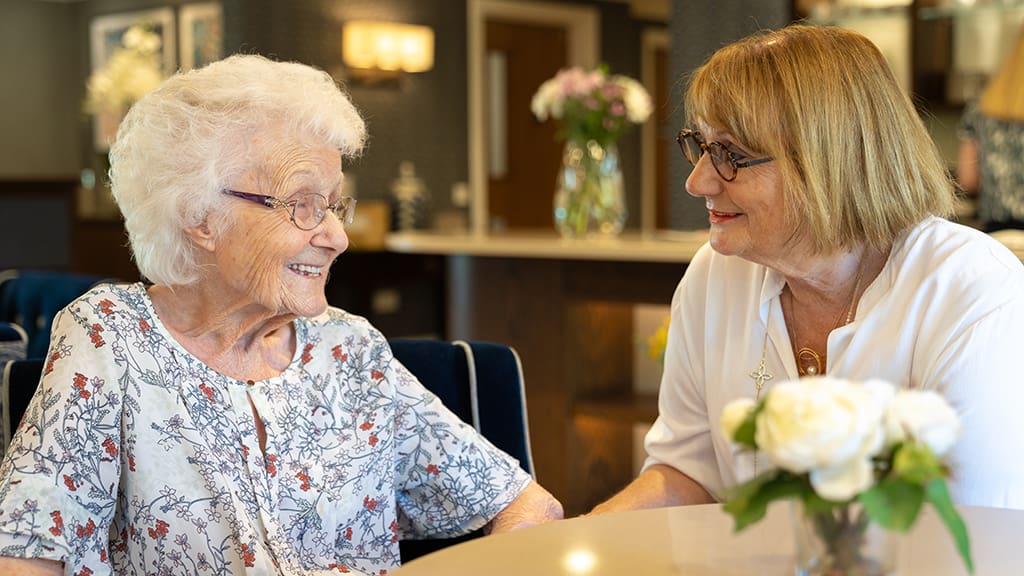Choosing a Care Home: A Complete Guide

Your complete guide to choosing a care home
Selecting the right care home for your loved one is a significant decision that requires careful consideration and research. It means finding a place where they will be safe, well cared for, and supported to enjoy their best quality of life. In this article, we will provide you with a guide to choosing the right care home, and how to ensure your loved one’s needs, preferences and well-being are met completely.
Why is it important to choose the right care home?
Above everything else, you want to be sure you are moving your loved one into a safe and comfortable environment, in which they can be happy and supported. If possible, include them in the decision-making process; after all, it’s their future home you are deciding on.
Discuss their preferences and concerns, and take their thoughts into consideration. Visiting potential care homes together and involving them in the choice will create a sense of ownership and comfort for them. This can often make the transition a much smoother one.
If you cannot involve your loved one, you will not only need to consider what you have learned about the care home options you have shortlisted, but also trust your instincts. When making such an important decision, what you see, feel, and hear as you visit the care home will enable you to make the right choice.
How to choose a care home
Start by researching care homes in your chosen area, and seek recommendations from healthcare professionals, friends, family, and support groups. Online directories and review websites such as carehome.co.uk can also provide valuable, first-hand insights.
It’s vital you visit each potential home to get a real sense of what living there may be like for your loved one. Visiting a care home without making an appointment can give you one view, but it may mean that you are unable to speak with the home manager, or someone in a position to answer all of your questions, or get to see all aspects of the home, as the staff will all have their own tasks supporting residents at any time.
At Porthaven Care Homes, every home has a dedicated Client Services Manager who is there to answer all of your questions. Their role is to support you as you make an informed decision.
Talk to people
Meet the staff. Are they friendly, empathetic, professional? Attentive to residents’ needs? Don’t be afraid to ask about qualifications, training, and the staff-to-resident ratio to ensure there is adequate support available.
If possible, speak with current residents and their families. Get feedback on their perspective of the care home. Ask about the quality of care, responsiveness to concerns, and overall satisfaction. You won’t get a more honest review than from those living there and their relatives.
Choosing the right location
This may sound simple, but choosing a care home that is in a location your loved one is comfortable and familiar with can be a great benefit. Some people are comfortable with the vibrancy of city or town life and courtyard outside space. Others feel more at home in the quieter countryside and fresh air, or where there are gardens and grounds to walk around and enjoy.
Keeping your loved one close by means that you can visit them easily, and that sense of community that they have built up in their home town doesn’t have to change or lessen. Alternatively, if your loved one doesn’t live nearby, this could be the opportunity for them to move closer to you and your family.
What is your care budget?
Another very important consideration is the financial implication of moving into a care home. Determine your budget, research the costs of care homes in your area, and identify any potential financial assistance programs or benefits that may be available.
Engage in open and transparent discussions with the care homes to determine whether they will be affordable. At Porthaven, we always recommend obtaining specialist financial advice from a qualified Care Fee Planner, such as those listed on the Society of Later Life Advisors (SOLLA) website.
What are your care requirements?
When choosing a care home, it’s important to first understand the needs of your loved one. Do they have a specific medical condition or a combination of diagnoses that requires specialist care, or do they simply need assistance with the Activities of Daily Living (ADLs)? Perhaps they have a dementia diagnosis that requires specialist dementia care?
Understanding their needs will help you narrow down the options, leaving you with a selection of homes that are fully able to provide the level of care and support required. It is also important to consider how their needs may change over time, and to ensure that the
community you choose can meet those needs as they develop, to avoid the disruption of a further move to another care setting.
All of our Porthaven Care Homes provide residential, dementia and nursing care. This means we are registered and able to support residents through their whole care journey. (MD – needs a link for dementia too, otherwise it could look as though we only do residential and nursing).
Are the care facilities suited to you?
Inspect the physical facilities of the care homes you are visiting. Are they clean, well maintained, and properly equipped? Consider things such as the layout, accessibility, and safety measures. These can include:
● Do they have handrails in the corridors?
● Are there emergency call systems at convenient locations?
● What general security measures are in place?
○ Access control measures?
○ Data storage systems?
○ Window and door locks?
Porthaven Care Homes are designed from the outset with resident safety and comfort at the heart of everything.
Contracts and policies
You should also carefully review the contracts and policies of the care homes you are considering. Pay attention to details such as the notice period for termination, refund policies, admission criteria, and any restrictions or limitations that might impact your loved one’s comfort and well-being. Seek legal advice if needed to ensure you understand the terms and conditions.
What else should you look for when choosing a care home?
There are some elements of care home life that make a huge contribution towards the enjoyment and well-being of our residents and your loved ones.
What are the meals and nutrition like?
Evaluate the quality, variety, and flexibility of the dining options provided. Dietary needs, allergies, and personal preferences should be considered to ensure adequate nutrition and enjoyment of meals. Does the chef meet with all the residents or their family to understand their preferences, and are they able to offer other options at any dining time should a resident have a specific request? Porthaven has always viewed good food and drink as one of the pillars of the care we provide. Our menus, variety, and quality of food is industry leading.
Are there any activities available?
Enquire about the range of social and recreational activities available for residents. Are there programs that align with your loved one’s interests and preferences, and are they available every day? Additionally, assess the availability of services such as hair and beauty, chiropody, physiotherapy, or even holistic treatments.
Our dedicated Activities and Wellbeing team are present seven days a week to ensure life is varied and interesting for each of our residents.
Day trips and outings
Getting out and about is highly beneficial for residents who are still able to do so. They provide a sense of freedom, independence, and connection with the community—all things that can greatly enhance mental and physical well-being. Does the home have its own minibus to take residents on trips out or even to attend medical appointments?
Ready to put together your care home short-list?
Taking all of this into consideration, the next thing to do is compile your short-list of potential care homes. With 19 homes across the UK, Porthaven is the perfect place to start. Catering to a range of elderly care needs, with our residents’ well-being and best interests at heart, to find out more take you next step now.
